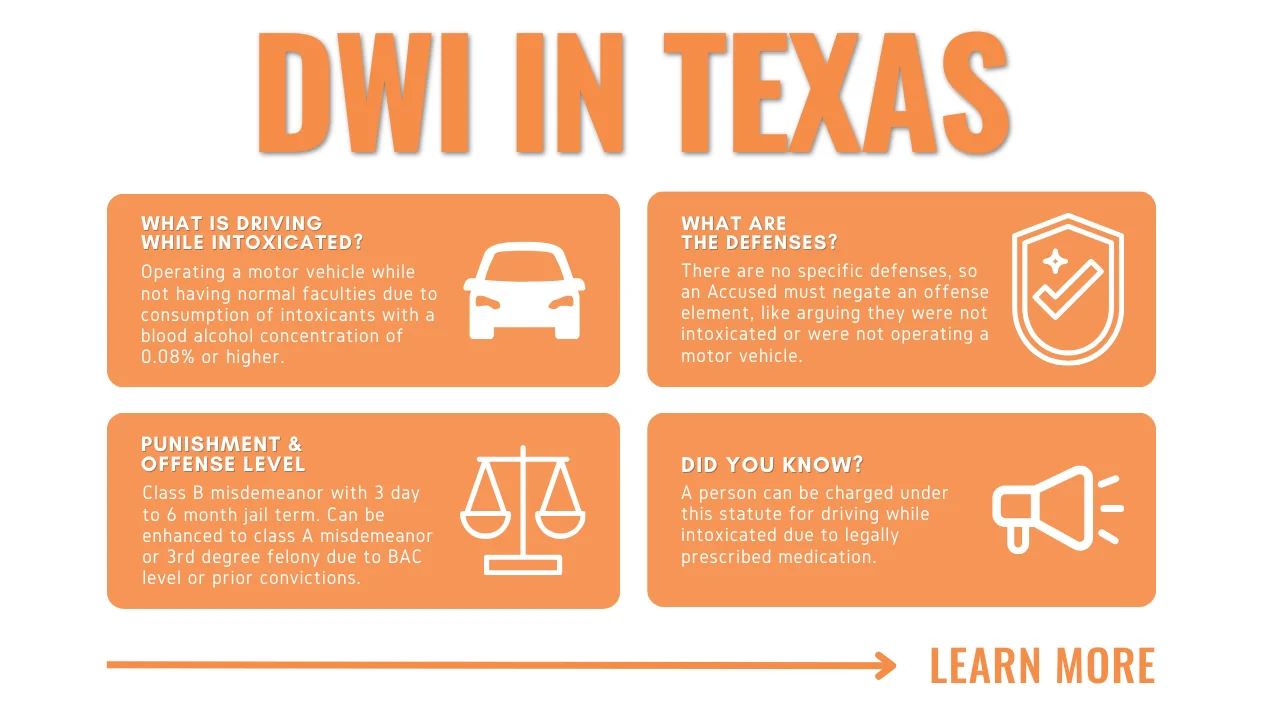
Key Steps to Beating A DWI Charge in Texas
To beat a DWI charge in Texas, you must assert and protect your constitutional rights. You must utilize due process to confront all witnesses and challenge all evidence. This means disputing reasonable suspicion, probable cause, and all forensic evidence. You can’t win if you don’t fight. Below are the key steps to get your DWI charge dismissed or reduced in Texas:
-
Hire a Criminal Defense Attorney
The first step is to hire an experienced criminal defense lawyer who can guide you through the legal process and protect your rights. -
Challenge Evidence
Dispute all evidence against you, including reasonable suspicion, probable cause, and forensic evidence (such as blood alcohol content results). -
Dispute the Stop and Arrest
Challenge the reason for the traffic stop and arrest, as well as the administration of field sobriety tests. -
Suppress Evidence
If the court suppresses evidence, such as breathalyzer or blood test results, the prosecution cannot use it. -
Request a Dismissal
Aim for a dismissal by challenging the evidence and forcing the state prosecutors to drop the charge. -
Challenge Forensic Evidence
Attack the validity of forensic evidence, especially BAC results, to potentially reduce the charge from a Class A misdemeanor to a Class B misdemeanor. -
Consider Reduction Options
If a reduction is possible, work with your attorney to have the charge lowered from a felony or enhanced offense to a lesser charge. -
Examine Blood vs. Breath Test
Determine whether a blood test or breathalyzer result is more vulnerable to attack based on the circumstances. -
Fight for Probation or Reduced Sentencing
If a conviction is inevitable, seek probation or other mitigated sentences to avoid jail time. -
Expunge or Seal the Record
If charges are dismissed, pursue expunction; if convicted, consider seeking an order of nondisclosure to seal the record after completion of the sentence.
Hire a Criminal Defense Attorney to Beat Your DWI Charge
Hiring a defense attorney is the most important thing to do after a DWI charge, and it’s the first thing you should do, when facing a DWI or DUI charge in Texas. There are fast-moving deadlines that require professional attention almost immediately after being arrested.Retaining the best DWI lawyer is going to place you in the strongest position possible. Experience matters. Results matter. Not all lawyers are equal in these fields, which is why a top-rated DWI law firm like Trey Porter Law is critical to get your DWI charge dismissed.
What are chances of DWI dismissal?
DWI charges are dismissed everyday in courtrooms across Texas. Charges are not dismissed through goodwill or luck, rather they are dismissed because a powerful defense forced the State prosecutors to dismiss the charge. Challenging evidence is a critical part of obtaining a dismissal.
How do you get a DWI dismissed in Texas?
Challenging evidence is the most effective way to dismiss a DWI charge in Texas, whether it’s a DWI first-offense, DWI 2nd, or even a felony DWI 3rd or more. DWI arrests are warrantless arrests, therefore everything must be challenged. If a judge suppresses evidence, the State cannot use it to prosecute.

Can a DWI charge be reduced in Texas?
Yes, an enhanced DWI offense can be reduced. A first-time DWI charge may be elevated to a Class A Misdemeanor or, in some circumstances, a State Jail Felony. The State has the power to “waive” the enhancement, and proceed on a Class B Misdemeanor DWI. Learn more.
- How can I get a DWI lowered in Texas? Attacking the State’s evidence is the most effective way to get a DWI charge reduced. The legal limit for blood alcohol concentration (BAC) in Texas is 0.08, however, prosecutors are not required to prove a BAC when seeking a DWI conviction. If the forensic evidence supporting a BAC is successfully challenged, the result is an automatic reduction from a Class A misdemeanor to a Class B misdemeanor.
- Is it better to take a DUI blood test or breathalyzer? Breathalyzer results have more scientific weaknesses, but are given voluntarily. Blood results present two opportunities for attack – the science and the probable cause for search.
- Can a DWI be dismissed in Texas? Yes, DWI charges can be dismissed in Texas. Obtaining a dismissal in a DWI case often involves challenging the reason for the stop and attacking the administration and results of the standardized field sobriety tests (SFSTs). If the reason(s) for arrest are invalidated, the arrest and all evidence that follows after, like a breath or blood result, are suppressed.

What happens when you get a first Texas DWI?
After being released from jail, a defendant facing a first-time DWI charge in Texas will receive a court date for arraignment. The arraignment setting is simply the first setting in a criminal case. Some courts will allow the setting to be “waived,” though it is best to consult with an attorney before waiving anything when facing criminal prosecution in Texas.
- Is it worth fighting a DWI case in Texas?
Every DWI charge is worth fighting. There is no scenario where pleading guilty at the first court appearance is the best thing to do. There are constitutional and procedural defenses that can be developed and explored in every case, no matter the circumstances. - How can I get out of my first DUI in Texas?
The best result in a DUI case is a dismissal. You can beat a DUI charge in Texas. No one charged with DUI should ever settle for a conviction. DUI is a Class C Misdemeanor in Texas, and so there is an option for deleting the entire incident as long as a final conviction is avoided. - Which is worse – DUI or DWI?
DWI is worse than DUI. In Texas, the offense of Driving Under the Influence (DUI) is reserved specifically for minors under 21 years of age. A minor can be charged as an adult with DWI, but an adult can never be charged with a DUI in Texas. Unlike DWI, there is no maximum penalty requiring incarceration for DUI. Learn what to do if you’re under 21 and facing a DUI charge here.
What can I expect from a DWI in Texas?
DWI charges are expensive and take time to resolve. While the local prosecutors pursue a conviction, the attorneys for the Department of Public Safety work to suspend driving privileges. This two-pronged attack requires a powerful defense. You cannot beat a DWI alone in Texas. It is critical to have an experienced, aggressive team standing between you and the Government.
- What is the statute of limitations on DWI in Texas? That statute of limitations for DWI in Texas is two years for a misdemeanor and three years for a felony.
- How long does a DWI case take? DWI cases in Texas can last more than two years. The clock on the statute of limitations stops when a case is filed. While delay can be frustrating and costly, it tends to favor the defense in almost all circumstances.

How bad is a DWI in Texas?
DWI is one of the most serious misdemeanor offenses in the Texas Penal Code. Depending on BAC, the maximum fine can be up to $6,000.00, and a first-time offender with no criminal history at all can still go to jail for up to 1 year. Many people ask how serious a DWI charge is, and the answer is very serious. This is the main reason it is critical to build a powerful defense in an effort to beat your DWI. Learn how a DWI impacts your background check here.
- What does a DWI cost in Texas? Being charged with DWI is expensive in Texas. Being convicted can be financially devastating. It’s impossible to put a price on what it’s worth to avoid incarceration and the potential of a permanent criminal conviction.
- Is a DWI in Texas a Felony? First-time DWI charges in Texas are Class B misdemeanors, though they can be enhanced by certain factors. DWI first-time offenders face jail time, permanent criminal convictions, thousands of dollars in fines, and driver license suspensions.
- How long does a DWI stay on driving record in Texas? A DWI charge stays on the record forever. If the charge was dismissed without probation, it is eligible for removal and deletion through expunction If the charge resulted in a conviction, it may be eligible to be sealed through an order of nondisclosure.
How likely is jail for first-time DUI in Texas?
First-time DWI offenders in Texas face up to 1 year in jail. Judges do not give credit for the time that passes while the case is pending. So, while jail may be less likely for first-time offenders, it is a legal possibility. This is why it’s critical to do everything possible to beat your DWI charge in Texas.
- How long is probation for Texas DWI? 2 years is the maximum period of probation for a misdemeanor DWI charge in Texas. 10 years is the maximum period of probation for a felony DWI charge.
- How long can you go to jail for DWI in Texas?If convicted, the maximum period of incarceration for DWI in Texas is 1 year in county jail for misdemeanors, two years for state jail felonies, and 10 years in prison for felony DWI charges. If this is your 3rd offense, the penalties are even more severe.













